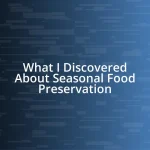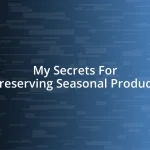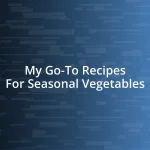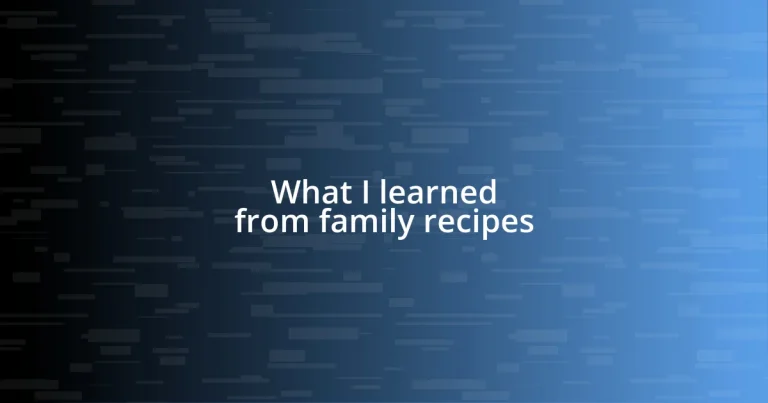Key takeaways:
- Family recipes serve as cherished traditions that connect generations, preserving cultural heritage and evoking emotional memories.
- Adapting recipes through substitutions and experimentation allows personal touches while honoring original family dishes.
- Sharing family recipes fosters community and strengthens bonds, creating opportunities for new memories and connections through food.
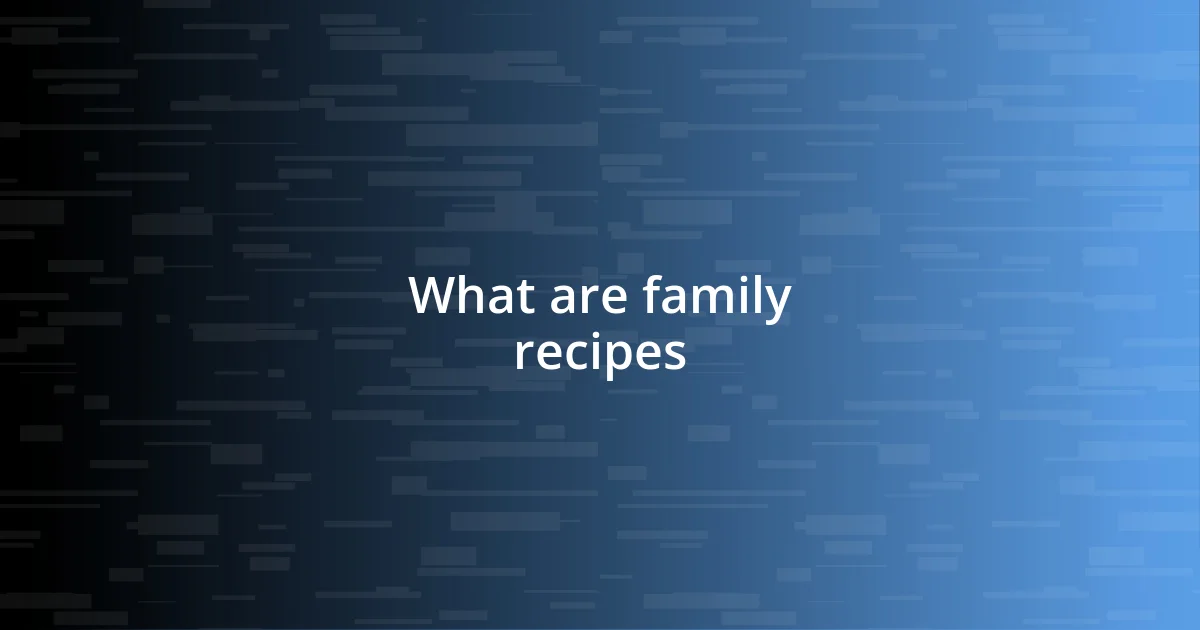
What are family recipes
Family recipes are more than just a collection of instructions; they represent shared traditions and cherished memories. I remember the warmth of my grandmother’s kitchen, where the scent of her famous apple pie filled the air—it wasn’t just about the taste, but the love and stories behind each ingredient. Have you ever thought about how a simple recipe can evoke such powerful emotions?
These treasured recipes often have deep-rooted significance, serving as a bridge between generations. I can still picture my mother standing over the stove, teaching me how to roll out pasta the way her mother taught her. Each fold and turn felt like a passing of the baton, rich with history and family identity. Isn’t it fascinating how food can connect us and preserve our heritage?
Over time, family recipes can evolve, adapting to modern tastes while still honoring the original spirit. I’ve taken my grandmother’s traditional lasagna and added my own twist with different cheeses and spices. This melding of past and present makes the experience of cooking both a journey and a tribute. What special changes have you made to family recipes that reflect your own personal touch?

Importance of family traditions
Family traditions hold a unique place in our lives, often serving as touchpoints that remind us of where we come from. I recall the excitement that filled our household every Sunday as we prepared a big family dinner. Gathering around the table, sharing stories while enjoying the flavors that have been passed down felt like a rite of passage. Isn’t it amazing how these shared moments can strengthen bonds and create lasting memories?
What stands out to me is how these traditions forge a sense of belonging. When I cook my family’s traditional recipes, I can feel the warmth of their love and the spirit of our heritage infusing the meals. Each bite carries a story, connecting me to my ancestors and reminding me of the values they instilled. Have you ever felt that same connection while preparing a beloved dish from your family?
Moreover, family traditions often create a legacy that we can pass on to future generations. I’ve begun involving my children in the cooking process, teaching them the same recipes my parents taught me. Just the other day, my daughter asked if she could learn to make my mother’s famous soup, excited to create her own memories. Isn’t it fulfilling to think that these simple acts can inspire new traditions that honor our past?
| Aspect | Family Legacy |
|---|---|
| Connection | Strengthens family bonds through shared experiences |
| Identity | Preserves cultural heritage and personal history |
| Continued Traditions | Sets the stage for future generations to create their own memories |
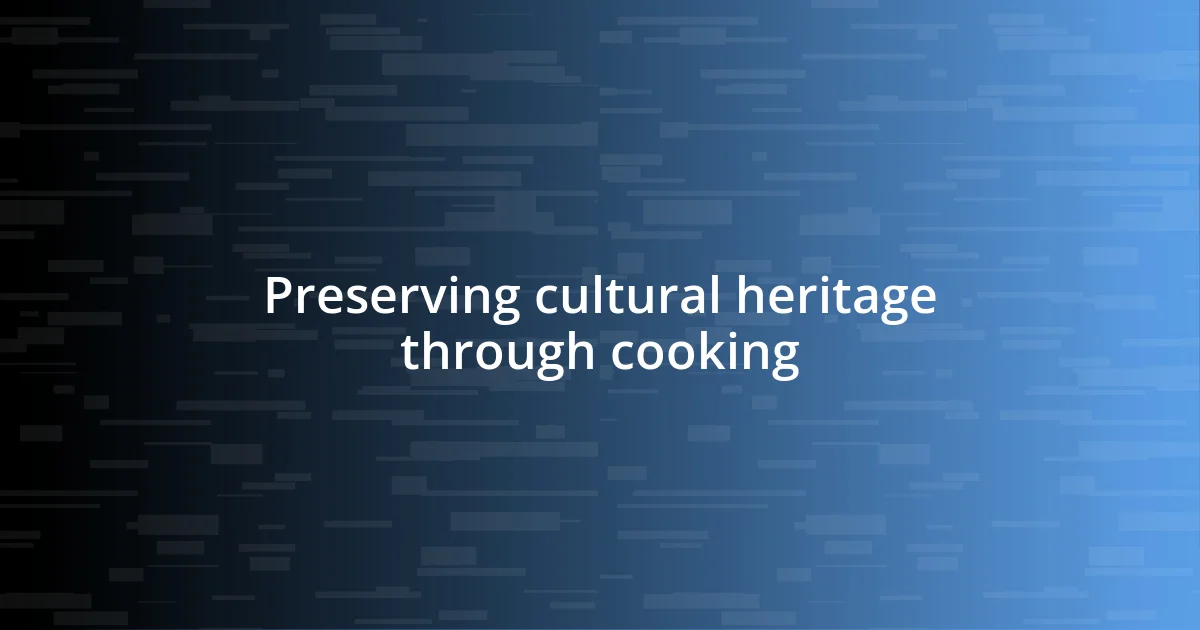
Preserving cultural heritage through cooking
Cooking is a beautiful way to preserve cultural heritage, weaving together history, identity, and familial relationships. I’ve had moments in my own kitchen where the simplicity of chopping vegetables transforms into a lively recollection of family members who once prepared the same meals. The very act of cooking connects me to my roots, reminding me of the recipes my great-grandmother brought over from her homeland and the stories she shared. Isn’t it fascinating how these recipes encapsulate generations of culture?
- Family recipes serve as living narratives that carry the essence of our ancestors.
- Cooking techniques can be passed down, preserving unique methods specific to cultures.
- Food has the power to evoke memories, making us feel connected to those who came before us.
- Sharing these recipes maintains a sense of identity, reinforcing our place within a cultural tapestry.
- Every dish prepared holds a reminder of the love and labor that went into its creation, enriching our heritage.
By weaving these experiences together, we not only honor those who cooked before us but also create a lasting legacy for the next generation. Each meal becomes a celebration of our history, inviting others to share in the rich tapestry of our lives.

Techniques for recipe adaptation
When it comes to adapting recipes, one of my favorite techniques is substituting ingredients to suit personal preferences or dietary needs. For instance, when I discovered that I had a dairy allergy, I had to replace traditional cream with coconut milk in my grandmother’s pasta dish. The first time I served it, I was nervous—would it taste the same? To my delight, it not only maintained a creamy texture but also added a delightful hint of sweetness. Have you ever made a substitution that transformed a family recipe into something uniquely yours?
Experimenting with cooking methods is another brilliant way to adapt recipes. I remember trying to replicate my uncle’s famous fried chicken, but I opted for baking it instead to make it a bit healthier. Surprisingly, the result was just as crispy and flavorful! I’ve found that this technique not only maintains the essence of the original dish but also introduces a fresh, modern twist. What have you discovered about your cooking through experimentation?
Lastly, I’ve learned that adjusting cooking times can significantly impact the final dish. A few months ago, I decided to reduce the simmering time for my mother’s chili, aiming for a lighter, fresher taste. The alteration released vibrant flavors without losing the dish’s heartiness. This taught me the importance of trusting my instincts in the kitchen—just because a recipe says one thing doesn’t mean it can’t evolve. Have you found that certain recipes change for the better with just a few tweaks?

Lessons in patience and practice
In my culinary journey, patience has become my most trusted companion. I remember the time I attempted to bake my late grandmother’s bread from scratch. With every knead and fold, it required not just time, but a special attention to detail. I vividly recall how my impatience led to a too-quick rise, resulting in dense loaves. It was a humbling experience, teaching me that great things often require a little extra time and care. Have you ever rushed through a recipe only to be met with disappointment?
Practice, too, is essential in mastering family recipes. I recall the countless weekends spent alongside my mother, perfecting her signature sauce. Each attempt brought subtle changes, as I adjusted flavors and techniques. The first few tries were far from perfect, but with those failures came invaluable lessons. As I consistently practiced, I felt an emotional connection growing—each improved batch not only honored her recipe but also deepened my understanding of her cooking style. Isn’t it rewarding to see such progress over time?
Finally, I’ve learned that cooking is as much about the journey as it is about the final dish. During my attempt to recreate my father’s famous paella, I faced challenges with the rice. Some grains were undercooked, while others turned mushy. Instead of feeling defeated, I focused on what went well and celebrated the experience. That night, we sat around the table, laughing and sharing stories, realizing that the lovely chaos of cooking often brings us closer together. What memorable moments have you experienced while practicing your family’s recipes?
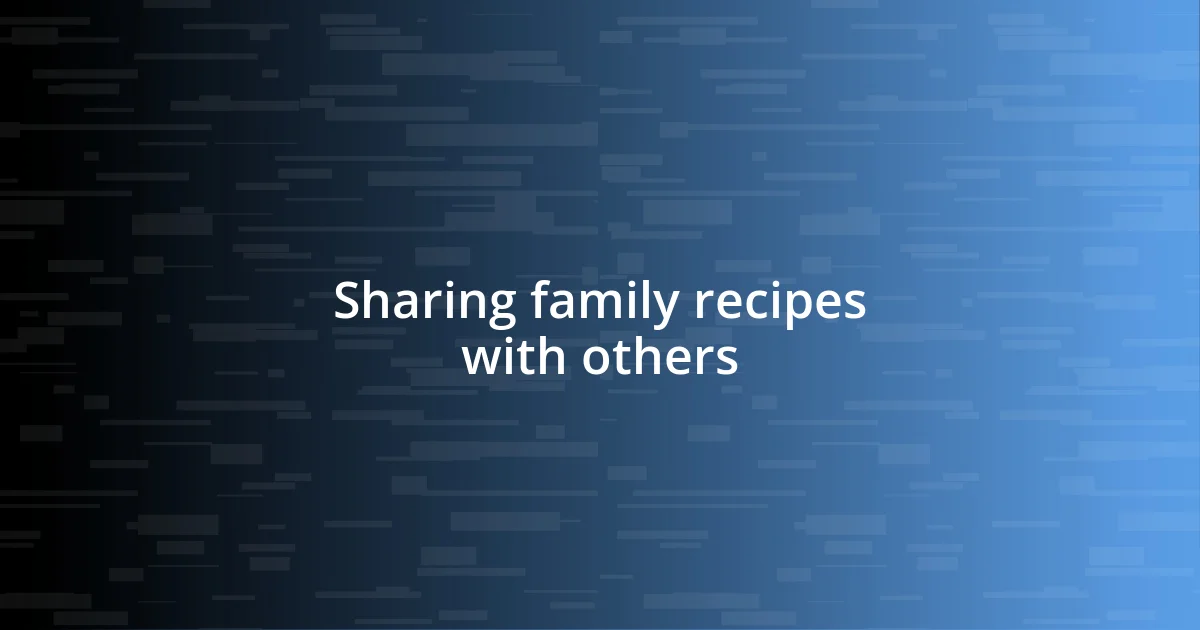
Sharing family recipes with others
Sharing family recipes can be one of the most meaningful ways to connect with others. I remember the first time I invited friends over for a dinner party, excited to share my mother’s famous lasagna. As I handed out copies of the recipe, it felt like gifting a piece of her history. The joyful conversations that erupted while we cooked together that evening created an atmosphere filled with warmth and laughter. Have you ever experienced that rush of happiness when you see others enjoying a dish that holds a special place in your heart?
I’ve found that sharing my family recipes goes beyond just exchanging cooking instructions; it fosters community. For instance, I recently shared my aunt’s teriyaki chicken recipe with a neighbor who was struggling to find quick weeknight meal solutions. Later that week, she knocked on my door with a plateful of her version. The flavors were slightly different but equally delicious, and it was a reminder of how recipes can bridge gaps between families. Isn’t it wonderful to think that a single recipe can spark new friendships?
Moreover, sharing these culinary treasures often opens up a dialogue about traditions and memories. One Thanksgiving, as we prepared my grandmother’s apple pie recipe together, my cousin revealed the stories behind each ingredient—how she would often sneak bites of cinnamon sugar before the pie even made it to the oven. This bonding moment reminded me that recipes aren’t just about flavors; they encapsulate love, stories, and a sense of belonging. How do the recipes you share reflect your personal or family journey?

Creating new memories with food
Creating new memories with food often feels like a dance of flavors and laughter. I’ll never forget the time my daughter and I decided to tackle my late aunt’s chocolate chip cookie recipe together. As we stirred the batter, her little giggles filled the kitchen, and I realized that those cookies were more than just a treat—they became a symbol of our bond and a new tradition in the making. When you think about it, isn’t it incredible how a simple recipe can turn into a cherished memory?
Food has this unique ability to transport us back in time, while also helping us craft new experiences. Recently, while preparing a family favorite—stuffed bell peppers—with my sister, we couldn’t help but reminisce about our grandmother’s kitchen, filled with vibrant aromas and love. Each bite brought back memories, but layering in our modern twists made it feel fresh and exciting. Have you ever cooked a family recipe only to find it sparked a whole new story?
I believe that every meal we create together has the potential to become a future memory. One snowy evening, my friends joined me for a homemade pizza night inspired by my mom’s dough recipe. Each person crafted their own unique topping combinations, and amidst the flour flying and laughter echoing, I felt a warmth that only comes from sharing food and stories. Doesn’t it make you smile to think that these delicious moments are becoming part of our lives, ready to be shared with others down the line?

